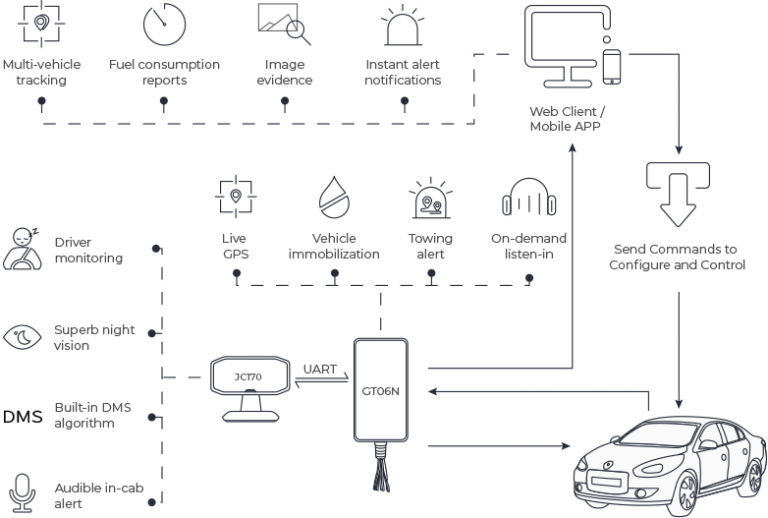In today’s competitive business landscape, efficiency is the name of the game. Companies are constantly looking for ways to optimize their operations and stay ahead of the curve. One such innovation that has been making waves in recent years is fleet tracking. This powerful technology is transforming how businesses manage their vehicles, leading to increased productivity, cost savings, and safer working conditions. Let’s dive into the world of fleet tracking and explore why it’s an essential tool for businesses of all sizes.
What is Fleet Tracking, and How Does It Work?
Fleet tracking is the process of monitoring and managing a company’s vehicles using GPS technology. This allows businesses to keep track of their vehicles in real-time, ensuring they are being used efficiently and safely. Fleet tracking systems typically consist of a GPS device installed in each vehicle and software that collects and displays the data.
The GPS device records information such as the vehicle’s location, speed, idle time, and route history. This data is then transmitted to the fleet tracking software, where it can be analyzed by fleet managers. The software offers a range of features such as real-time location tracking, route optimization, vehicle maintenance reminders, and driver behavior analysis.
The Undeniable Benefits of Fleet Tracking
Fleet tracking offers a myriad of advantages that can significantly improve your business operations. Here are some of the key benefits:
1. Cost Savings
One of the main reasons businesses turn to fleet tracking is the potential for significant cost savings. According to a study by the Aberdeen Group, companies using fleet tracking systems experienced an average fuel cost reduction of 13.2% and a 15% reduction in idle time.
These savings are achieved through a combination of reduced fuel consumption, optimized routes, and better vehicle maintenance. By closely monitoring vehicle usage, fleet tracking can help identify areas where resources are being wasted and suggest improvements.
2. Increased Productivity
Fleet tracking systems can help businesses boost productivity in several ways. First, real-time location tracking allows dispatchers to make more informed decisions when assigning tasks to drivers, ensuring the most efficient routes are taken. Second, by analyzing route history data, fleet managers can identify patterns and trends that may be affecting productivity and make adjustments accordingly.
For example, a plumbing company in California reported a 20% increase in the number of jobs completed per day after implementing a fleet tracking system. This improvement was attributed to better route planning and more efficient use of resources.
3. Enhanced Driver Safety
Fleet tracking technology can also help improve driver safety. The software can monitor factors such as speeding, hard braking, and sharp turns, allowing fleet managers to identify unsafe driving behaviors and address them proactively. This not only reduces the risk of accidents but can also lead to lower insurance premiums.
A case in point is a transportation company in Texas that experienced a 45% reduction in accidents and a 25% decrease in insurance costs after adopting a fleet tracking system. These impressive results were achieved by identifying and addressing risky driving behaviors, leading to a safer work environment for drivers.
4. Improved Customer Service
Fleet tracking can also have a positive impact on customer satisfaction. Real-time location data allows businesses to provide accurate ETAs to their customers, resulting in a smoother and more transparent experience. Additionally, fleet tracking can help companies identify and address service issues more quickly, ensuring they are resolved before they escalate.

Key Considerations When Choosing a Fleet Tracking System
If you’re considering implementing a fleet tracking system, it’s essential to carefully evaluate your options to find the best solution for your business. Here are some key factors to consider:
- Ease of use: Look for a system with an intuitive interface that can be easily navigated by your team.
- Scalability: Ensure the system can grow with your business, allowing you to add more vehicles or features as needed.
- Integration: Choose a system that can seamlessly integrate with your existing business software, such as accounting or payroll systems.Jimi offers an API protocol to integrate ourdevices with your existing system and enableyou to access all the data collected by TracksolidPro.
- Customer support: Opt for a provider that offers reliable and responsive customer support to help you troubleshoot issues and make the most of your investment. Jimi will provide you with best technical support within 24 hours wherever you are, whenever you need it.
Why Jimi IoT?
Jimi relies on innovative solutions for driver status monitoring and vehicle tracking for fleet management, more effective driver tracking, recording, notification, monitoring and efficient fleet management.
Jimi has more than 20+ years of experience in the loT/loV industry and a team of experts to assist you in the adoption. We offer ready-todeploy solutions (with IoT SIM cards for worldwide connectivity) as well as OEM, ODM.and OBM services to suit your industry-specific needs. Contact us at info@jimilab.com
Fleet tracking is a game-changing technology that can revolutionize your business operations. By providing real-time vehicle data, it enables you to make more informed decisions, leading to cost savings, increased productivity, enhanced driver safety, and improved customer service. If you’re looking to stay ahead of the curve and optimize your business efficiency, there’s no better time to invest in a fleet tracking system.
 EN
EN ES
ES PT
PT TH
TH VN
VN JP
JP


